By Charlene Muhammad CHARLENEM
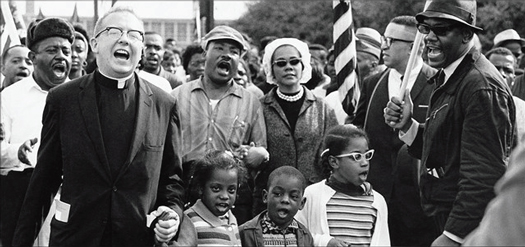
Many across the U.S. and the world celebrated slain civil rights leader Dr. Martin Luther King, Jr.’s birthday in January, remembering a hero who advocated for equal and social justice for Blacks through non-violence.
Elementary school renditions during this time about his historic “I Have a Dream” speech, delivered during the historic 1963 March on Washington for Jobs and Freedom, tend to highlight his call for integration. During prayer breakfasts and proclamations in political chambers, celebrants lift Dr. King’s early “turn the other cheek” doctrine and calls for integration in celebrations Jan.15, his birthday, and Jan. 18, the official federal King Holiday.
But what about the revolutionary Dr. King, who in his later years of life confided in dear friend, actor, activist and philanthropist Harry Belafonte, that he had realized he was trying to integrate his people into a burning house?
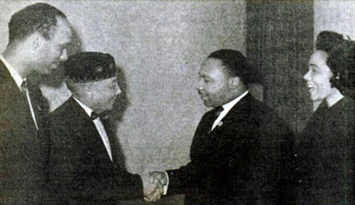
What about the Dr. King that the Honorable Minister Louis Farrakhan of the Nation of Islam called a bold preacher who confronted the reality of White racism?
What about the radical Dr. King, Min. Farrakhan brought to the world through his preparation for the Justice Or Else! event Oct. 10, 2015 in Washington, D.C., the Dr. King who called for Blacks to redistribute the pain of injustice and brutality suffered at the hands of Whites in America by waging an economic boycott of U.S. corporations?
Min. Farrakhan asked the world to study Dr. King’s last speeches, and reflect on the evolution of his message, which moved from one of integrationist “Dreamer” in 1963, to one of a true wide awake revolutionary in 1968 when he was murdered.
In his very last speech in Memphis in the midst of the striking sanitation workers on April 3, 1968, Dr. King spoke of Black retaliation against the forces of wickedness using “the power of economic withdrawal,” the Nation of Islam Research Group pointed out.
“Up to now,” Dr. King taught, “only the garbage men have been feeling pain; now we must kind of redistribute the pain.”
Dr. King said Blacks did not have to throw a Molotov cocktail, fire a single shot, or burn down their communities for justice, but to disconnect monetarily from that which had denied them freedom, justice and equality. He called for an economic boycott, citing specific corporations, including Coca Cola, Seal Test Milk and Wonder Bread, but also called for Blacks to spend those redirected dollars with Black businesses.
Min. Farrakhan has shared how he did not know Dr. King was saying those things. “When I read it, I said, this man, you must know the reality of Dr. King. He’s more than a dreamer and don’t you let them throw the ‘Dream’ speech on you from ’63,” Min. Farrakhan instructed during his lecture last August in Memphis, Tenn., which was part of a tour to promote Justice Or Else!, the 20th anniversary gathering of the Million Man March in Washington, D.C. The highly successful event in October drew 800,000 to 1.5 million people, according to some estimates.
“Let them play for you the speech that he made in New York City when he condemned the hypocrisy of the Johnson government that’s fighting a war in Vietnam against poor people there and practicing violence, then want Dr. King to preach nonviolence to us, while they’re training you to kill people that never did nothing to you overseas,” Min. Farrakhan said.
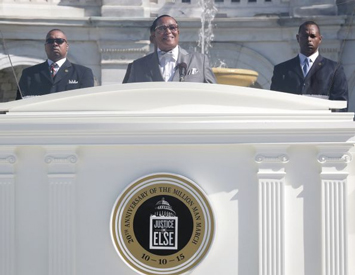
Not only did Min. Farrakhan uplift Dr. King’s words, but he resurrected his desire to retaliate after White supremacists bombed 16th Street Baptist Church in Alabama, and killed four little Black girls.
“He wanted to do all-out war, not violence. But shut it down, but he didn’t have the support. He wanted to boycott Christmas. So, today, so, today, I’m asking us, all of us, let’s boycott Christmas,” in Dr. King’s name, Min. Farrakhan said.
As Dr. Cornel West highlights in his book, “The Radical King,” after more than 40 years, few people appreciate how truly radical the ambassador of non-violence and one of the most recognizable leaders of the civil rights movement was.
In the book, arranged in four parts, Dr. West illustrates Dr. King’s revolutionary Christian vision as a democratic socialist, underscoring his identification with the poor, his unapologetic opposition to the Vietnam War, and his crusade against global imperialism, according to book notes.
According to Brother Astenu, co-chair of the Committee to Eliminate Media Offensive to African People (CEMOTAP), the 1963 “Dreamer” Dr. King is the one always represented to Blacks and the world instead of the more “militant” Dr. King, because it is expedient for the global system of White supremacy to keep Black people as docile as possible.
“One way to do this is to de-emphasize the more militant aspects of our liberation struggle and promote the idea of passive resistance that is predictable and can be controlled. The White power structure wants to decide what form of resistance is acceptable and what is not,” Brother Astenu said.
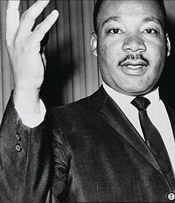
“Malcolm X and the Black Panthers who promoted armed resistance and struggle are ‘bad.’ Nonviolent, civil disobedience is good. The Dr. King who dreamed of racial reconciliation is what the power structure wants us to know about. The Dr. King who pointed out the hypocrisy of the U.S. involvement in the Vietnam war has to be suppressed,” the activist and educator told The Final Call.
Many of Dr. King’s disciples or aides, and especially his enemies–including the U.S. government that kept him under surveillance, plotted against him and tried to push him to commit suicide–were aware of his evolution, that he had grown from turning the other cheek and loving one’s enemies to Blacks forging justice by withdrawing not only their money, but their skill and talent from American society.
Yet the real legacy of Dr. King was whitewashed, bypassing important words in speeches during the last two years of life before he was assassinated on April 4, 1968.
How and why was such a revolutionary as Dr. King recast as an acceptable Negro leader? Hadn’t those who followed him until the end known about his desires, thoughts and direction?
Dr. King was co-opted and neutralized because his non-violent philosophy is what the establishment wanted to hear, said Minister Abdul Akbar Muhammad, international rep-resentative of the Nation of Islam.
“Min. Farrakhan was able to make people look at a different kind of Martin Luther King and have a different kind of respect for him and what he struggled with in trying to bring justice to our people, and to bring those to the bar of justice who have mistreated our people, and I thank Allah that he blessed Min Farrakhan to see that in his reviewing the life of Dr. Martin Luther King,” he said.
This Dr. King, the real legacy of Dr. King, is what is resonating with fearless Black youth and adult advisors and activists, such as Black Lives Matter, who are today protesting in some of the same ways as Dr. King and his followers at that time.
“Our struggles today are centered around the injustice in the inner cities with the law enforcement vs. the Black community, and so King in the midst of this emerges because Min. Louis Farrakhan brought out and put in front of the Black public a different picture of Martin Luther King, a different look at Martin Luther King, in terms of what his real thinking was about,” said Min. Muhammad.
“In the deep reaches of their hearts and their minds, (the enemy) knew that because of the mistreatment meted out to Black people, in the hearts and minds of those Black people, many of them, would seek some kind of retaliation, and King’s taking the nonviolent path said to White America you’re safe with me and my philosophy,” he explained.
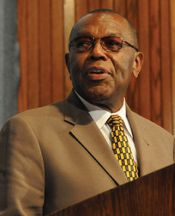
“So he was cast as the leader that (the enemy) could work with, the leader that ‘we’ should back, because if others get involved, they may not have the patience and the tolerance and the concern and love that they saw come out of Martin Luther King,” Min. Muhammad explained.
“When you ask the question what is Dr. King’s true legacy, I would say that it has to be that Dr. King was truly in it to win,” said Tamika Mallory, founder of Mallory Consulting, a strategic planning firm in New York City, and co-convener of Justice Or Else!.
“He was in it and down for the long haul and even willing to give his life in order for his people to be free, and I think many of us say that. We talk about how we’re prepared to die, but the truth is, we really are not walking in the face of fear and death in a way that Dr. King did, and I think for us, if we want to live up to what it means to be a Dr. King, we have to be fearless leaders, and even when we are afraid, we’re willing to step into the face of fear, because the goal, the overall mission is more important than any one of us individually,” Ms. Mallory told The Final Call.
People, and particularly Blacks, have not been taught and exposed to the full story behind Dr. King, who he was, his beliefs, and ultimately his approach and how he was beginning to evolve into a different way of addressing the systemic racism and oppression Blacks had at that time been dealing with and are still dealing with today, the young leader expressed.
“I think that if you water down Dr. King’s legacy, it will keep people, we would be protesting. We would be making political statements, but we won’t be true fighters, and I think that that’s been the reason why Dr. King’s legacy has been watered down in such a way is because the same reason why he was killed,” Ms. Mallory stated.
“He was such a powerful force, and I believe that America realized that if he had actually gained all of the knowledge and strength that God was in fact granting him towards the end of his life, and been able to put that all to use, he would have probably been one of the most powerful forces in the world in terms of someone who was standing up for the freedom and liberty of the underserved and of the oppressed.”
Historians and activists told The Final Call Dr. King was always about challenging and confronting American society, forcing it to live up to its stated principles.
For instance, they noted, America claims to be a democratic society which believes in a certain degree of ethics and morality, on the one hand, all the while excluding people from participating on the other. Dr. King was bold and radical enough to call her on the carpet and demand she change her ways, but that Dr. King was hidden.
“I think they had to get in front of that, and just as they killed him, they also watered down his legacy in order to give us the sweet side of Dr. King, but we all know that if we do the research, and certainly the Honorable Minister Louis Farrakhan often speaks about the fact that Dr. King was a radical leader. He was a radical fighter,” Ms. Mallory said.
The young leader also pointed out that aspect of Dr. King is not portrayed even in the movie “Selma,” the film about the 1965 Selma to Montgomery voting rights marches. Although he knew people could potentially be killed, that the protestors’ lives were going to be in danger, Dr. King pressed ahead.
“He chose a place that he knew that he was walking into the face of fear and death, and he walked into it and stood tall and ultimately won,” Ms. Mallory remarked.
With the advent of internet, social media and independent Black producers and directors, a different image of Dr. King is beginning to emerge, added activist Brother Astenu.
According to Brother Astenu, Blacks have access to Dr. King’s “Beyond Vietnam” speech where he denounces America’s involvement in the war, and the government’s failure to provide the resources necessary for the Black community’s survival and development.
“Dr. King supported reparations for descendants of enslaved Africans. I have even seen footage recently of Dr. King admonishing Black people to love their skin color, hair texture, and facial features. So I am encouraged by that,” he said.












